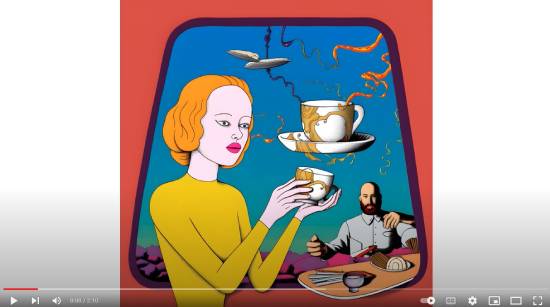Montréal producer and multi-instrumentalist Moses Belanger, who grew up in the house music tradition, explores new horizons on his debut album Fullum, which features collaborations with Claudia Bouvette, Marie-Pierre Arthur, Mantisse, and David Lee.
 “I totally come from the world of house music, I absolutely adore that genre. I love its groove, its rhythm, but I find it often lacks an emotional component,” says the 30-year-old composer.
“I totally come from the world of house music, I absolutely adore that genre. I love its groove, its rhythm, but I find it often lacks an emotional component,” says the 30-year-old composer.
He decided to seek out said emotional component by borrowing elements from jazz, hip-hop, soul and UK garage. “This album is a bit like my musical coming out,” he says. “I wanted to showcase what I can do, in terms of sonic composition.”
Although it had never materialized in a large-scale musical project like Fullum, this musical open-mindedness is part of the Belanger’s artistic DNA. Originally from Mont-Saint-Hilaire, on Montréal’s South Shore, Belanger became seriously interested in music in his mid-teens, while learning to play drums and classical guitar.
But urban dance became his first true passion, when he moved to Montréal about a decade ago. Belanger used to go to the now-defunct Bleury Vinyl Bar to participate in dance competitions.
Those competitions were often followed by open mic events for rappers. A whole new world opened up before the young artist’s eyes. “That’s where I met a guy from Toronto, a rapper called ELMNT, and he invited me back to his place for a beer,” says Belanger. “He had a home studio, and we started making beats just for fun. I’d always thought you needed a band to make music. I was convinced that beat-making software was out of reach, and only available in major studios. I had no clue it was that accessible.”
That evening was nothing short of an epiphany for Belanger, who got into beat-making almost obsessively from that moment on. In 2015, he created house duo 99 Wolves alongside ELMNT, before moving on to solo productions. He then became half of another duo, alongside French rapper Eddy Woogy, for the 2019 EP Ke Za Ko. Throughout all this, Belanger perfected his craft by completing an audio training program at Trebas Institute ,and by taking private piano lessons with Luc Gilbert – best known for writing the theme song of the massively popular sit-com La Petite Vie. “I adamantly wanted to understand music, and know how to speak that language,” says Belanger. “I refused to be a slave to samples.”
This whole journey can be heard on Fullum, a sonically rich, loose album named after the street where he currently resides. One event tuned out to be particularly significant in the creation of the project: SOCAN’s Kenekt Studio song camp. The camp invites singer-songwriters and producers, most of them emerging, to collaborate in a studio for several days. “The camp happened at just the right time, which is to say right at the end of the album production,” says Belanger. “I felt like releasing it, and the song camp gave me the kick in the butt I needed.”
Three of the 10 songs on Fullum – “Coffee in the Morning,” with David Lee and Marie-Pierre Arthur; “Rien,” with Claudia Bouvette and Mantisse; and “Préféré personnel,” with Super Plage and Hawa B – stem from the song camp, where guest artists write a song in a small team, and record it the same day. “It’s an unbelievable experience,” says Belanger. “The result is always interesting, when you’re challenged to create a song from scratch. All too often, when you’re in the studio on your own, things are loose, you don’t have a framework. But when you have a deadline [like at the song camp], there’s a bit of pressure, ensuring that everybody’s on the same wavelength.” Belanger continued collaborating with Marie-Pierre Arthur and rapper David Lee, among others, after the camp was over.
Beyond what the camp brought to Fullum’s production process, Belanger wanted the album to be one of musical encounters. Other featured artists include Moroccan singer Thaïs Sala, who can be heard on three songs; Montréal singer Papaflavor, also known as one half of Bet. E & Stef; and the DJ/producer and long-time collaborator, The Holy.
Only one song on this “solo” album features Belanger alone: “Si je mens, je meurs,” which is the first time he’s “on the mic.” “I’ve always been shy about using my voice,” he says. “I’ve worked with such incredible singers that I felt I was out of my depth. However, I decided to fix that when I realized I didn’t have a single truly solo song. I grabbed my microphone and hummed a melody.”
The lyrics took a while to find their final form. “It’s a highly personal text that tells the story of my journey in music,” he says. “Specifically, it’s about how music always came before everything else in my life: I didn’t have time for love, I turned down jobs… And I experienced quite a bit of solitude through it all,” he confides. “I really wanted those lyrics – because it’s my first solo song – to be deep and powerful.”
As far as we can, it was truly worth the effort.
